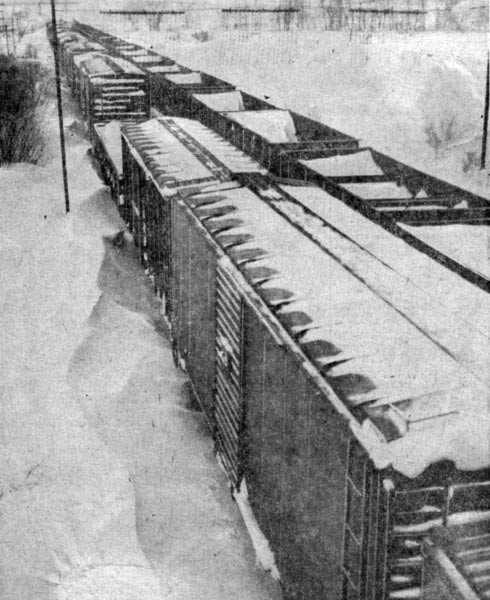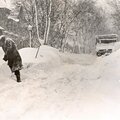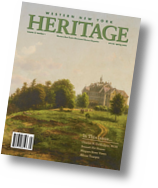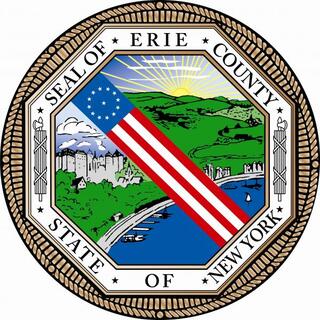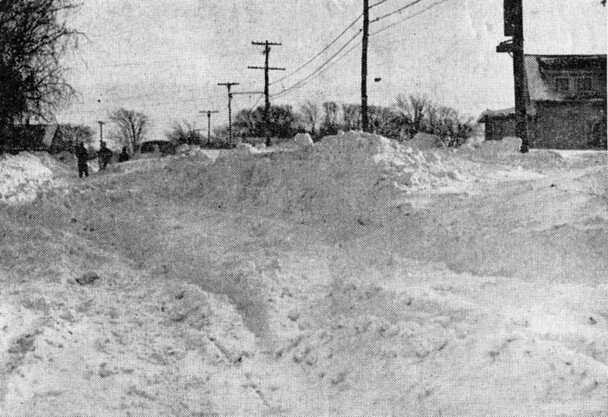
"Almost impassable to traffic is Abbott Rd. outside the city line. Here is how it looks near the Ridge Rd. intersection, where seven-foot snowdrifts have plugged it. In the background is a stalled car, one of many such storm victims."
The months of December 1944 and January 1945 in Buffalo (and the northeast) saw a succession of snowstorms, each compounding problems caused by the previous storm. By December 29, 34.6" had fallen in Buffalo, compared with 1.7" the previous year. Thirteen inches fell on December 11 and 12, interrupting production of war materials in local plants such as Bell Aircraft, American Car & Foundry, Curtiss-Wright, Houde and Buffalo Arms. The Dairymen's League said that almost no milk was delivered to the city; bread was not delivered to homes because side streets were impassable. Most people had to walk wherever they wanted to go. On Christmas day, another 8" fell and a cold snap began. The region, especially the city, faced a major shortage in people to help shovel the snow from streets, trolley lines, and the rail yards. Soldiers of the Second Service Command, a home front arm of the military that managed the administrative and support activities previously operated by regular military units, assisted with snow removal. But worse was to come.
At the end of December, a brief thaw was followed by freezing temperatures and more snow. This created a massive situation in Buffalo's rail yards, where freight cars were frozen to the tracks and switches also froze. As the second largest rail center in the U.S. (Chicago was first) in terms of freight that originated or passed through daily, the movement of trains was imperative. Picks and shovels were required, but the real shortage was manpower. Railroads in Buffalo appealed to the War Department for assistance, particularly in releasing servicemen with prior railroad experience. They had 5,000 men working by hand to clear tracks, but it was not enough and many did not have railroad skills. By the middle of January, such assistance was on the scene and making a difference in moving the backlog of cars, but another blizzard struck again on January 22, with sleet and winds of 45 miles an hour. The situation in Buffalo caused rail traffic problems up and down the eastern seaboard. War material was held up but also coal, the primary fuel for locomotives, schools, businesses and homes.
The inability to remove snow from the tracks, free the trains and move the daily normal 85 trains and 5,200 cars, prompted the Car Service Division of the Association of American Railroads to declare an embargo on the shipment of any but war freight and essential civilian supplies for three days, January 27 - 29. Army and Navy personnel were responsible for determining which rail cars could move and which had to wait. Livestock, poultry, coal, coke, tank cars, and local freight were prohibited. Shipment of food was permitted only under a government bill of lading. The lack of empty rail cars forced local flour mills to suspend production. By the 29th, 180 soldiers, all experienced railroad workers, were on the scene, and much of the backlog was cleared.
On January 31, however, another snow and windstorm struck, causing trains to become physically stalled in drifts and tangling the rail yards again. Additionally, supplies of coal for rail yard switching locomotives was running very low, forcing some out of action, adding to the problem. But the lack of coal was also creating crises for businesses, as well. Local night schools were closed to conserve coal and businesses shortened their hours.
The weather stabilized and rail traffic finally returned to normal by February 6. Total snowfall in Buffalo from December 11, 1944 to February 1, 1945, was 90". January alone received 50.6", the most ever recorded in one month. The temperatures during this period rose above freezing only once or twice. Many believed that transferring soldiers with railroad experience made success possible; they received regular railroad pay, plus room and board and their military salary.
These photos are from a scrapbook; the newspaper source is unknown. The date taken is likely between January 26 and 29, 1945 because captions refer to an embargo in effect. Captions in quotations under the photos are original.
The person who pasted the photos in the scrapbook wrote in pencil, "A winter not to be forgotten."

"Passengers taken off stalled train in Orchard Park. Wind swirled snow about this Baltimore & Ohio train, stalled since Wednesday morning while workers and passengers stood by when this dramatic picture was made by William Fredricksen of California Rd., who, with other village residents, took the 100 Buffalo-bound passengers coffee and sandwiches. Early today, the train's fuel for heating gone, the passengers were removed to Orchard Park homes."
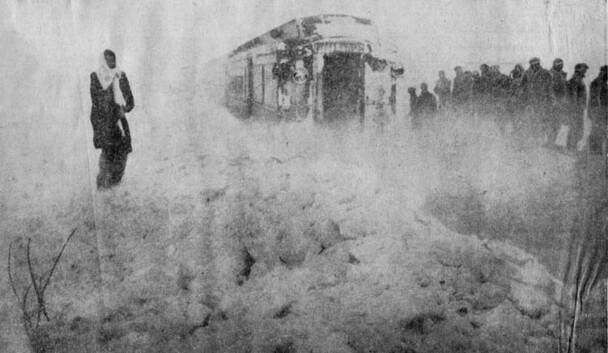
"Off the track! This head-on picture of a B & O locomotive sent to Orchard Park Thursday to pull a stalled Buffalo-bound train was made by George Trevett, 15, of Webster Rd., Orchard Park, a few minutes after it ran off the track. It gives a graphic idea of how deep the snow was at this point."
